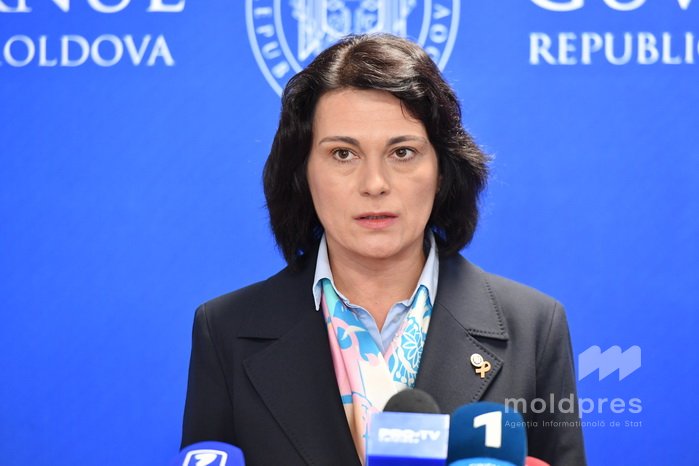
Over 900 criminal files related to drug trafficking; Moldovan interior minister says ministry proposes draft to tighten penalties for narcotic substances' trafficking
Over 900 criminal cases related to drug trafficking have been registered since the beginning of the year 2025. The Interior Ministry (MAI), jointly with the General Police Inspectorate (IGP), has proposed a draft to toughen penalties for this type of offenses.
Interior Minister Daniella Misail-Nichitin emphasized that drug trafficking stayed a challenge for Moldova.
“To discourage this phenomenon, a draft was proposed to tighten the penalties for trafficking in narcotic substances. They will be applied for the circulation and smuggling of prohibited substances, including precursors and other psychotropic substances. Likewise, we will tighten penalties for those involving minors in drug trafficking,” said Daniella Misail-Nichitin.
At the same time, the official announced that, next week, a meeting of the National Anti-Drug Commission will be held.
“There are three groups working sectorally. The first one is dedicated to combating this type of crime, another focuses on prevention and education measures and the third on health measures and reducing public health risks. Also, Moldova has initiated and institutionalized the National Drug Observatory. Also, the Early Warning System has been created, and in 2026, a national-level policy document in the field of drugs prevention and combating is to be carried out,” emphasized Daniella Misail-Nichitin.
The new legislative proposals provide for harsher sanctions for those who involve minors in drug consumption or transmit prohibited substances to them. For these acts, only imprisonment will be applied, with fines being eliminated. Aggravating forms will also be introduced, for example, when the act is committed with violence, in educational institutions, near schools or by multiple persons.
For very serious cases, such as the involvement of a criminal organization or particularly large quantities, the penalty can reach up to 20 years in prison.
Moreover, the law will limit the situations in which a person can avoid criminal liability for drug-related acts. Release from liability will be possible only in exceptional cases, when the act was not committed for sale or distribution purposes.
At the same time, sanctions will be more severe for the sowing, cultivation, or distribution of prohibited substances, including ethnobotanicals and new psychoactive substances. Similarly, it will no longer be possible to avoid criminal liability when the act was committed for sale purposes.
Thus, the changes proposed by the authorities bring harsher penalties for aggravated forms of offenses, broaden the list of prohibited substances and clarify the regime of precursors, ethnobotanicals and new substances appearing on the market. Also, the legal framework will provide much more severe sanctions for smuggling drugs and weapons, including for serious cases or within criminal groups, in order to deter these acts and protect citizens' safety.
At the same time, the legislation is harmonized with European standards, so that responsible public authorities can intervene more promptly and effectively, based on a solid framework meant to protect the health and safety of each citizen.
Minister of Education announces launch of national information campaign in schools on risks of drug use and trafficking
Moldovan parliament joins national campaign, 16 Days of Activism Against Gender-Based Violence; parliament building lit in orange
Centru Court of Appeal of Moldova upholds sentence in case of MP Irina Lozovan
PHOTO GALLERY // Conference on initiating national programme, Heart Transplant in Moldova
Moldovan General Police Inspectorate says drone landed in Floresti district is Russian-made Gerbera type
National Army intercepted six drones in national airspace
PHOTO // Alert in Floresti. Drone marked with letter "Z" crashed in orchard; area secured by police
Police conduct new searches in criminal case on illegal political party financing
Shahed-type drone crossed airspace of Moldova
Moldova to have extended access to UNESCO emergency funds for protection of heritage
EU increases financial support for Moldova in 2026 European budget
VIDEO, PHOTO // Gerbera drone, crashed in Floresti district, displayed outside Moldova's Foreign Affairs Ministry; Agreed Russian ambassador receives another protest note
One-off childbirth allowance to be increased to 21,886 lei in Moldova; Labour Ministry proposes draft for public consultations
Deputy PM says Moldova rejected, to always reject any attack on its security, territorial integrity
Former MP Constantin Țuțu to learn sentence on 27 January 2026
First-ever event in Moldovan schools: 3,200 pupils test digital skills
Japan to provide 21 million lei grant for modernization of Teleradio-Moldova Company
Families of Moldovan diplomats deployed to Kingdom of the Netherlands to be able to work
Parliament to review draft of new law limiting public procurement contract value
Good news for Moldovans in Croatia and Canadian province of Quebec
Government initiates negotiations on Agreement with Romania on visa exemption for diplomatic and service passport holders
Individuals can register till November 28, to receive compensation for current month; Moldovan labour minister says assistance to be provided individually for each household
Moldovan, Armenian officials approach EU accession process, diaspora relations
All scenarios investigated, including perspective of discrediting Moldova - interior minister says
More opportunities for culture professionals: government approved Moldova's accession to Creative Europe Program

